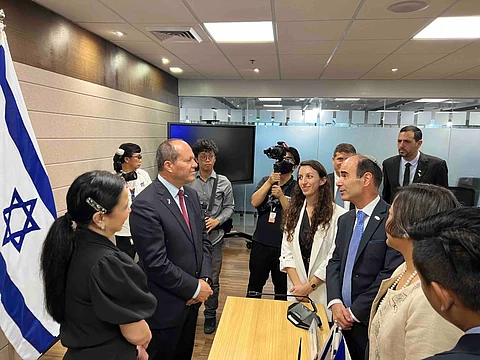
- NEWS
- the EDIT
- COMMENTARY
- BUSINESS
- LIFE
- SHOW
- ACTION
- GLOBAL GOALS
- SNAPS
- DYARYO TIRADA
- MORE

The Department of Trade and Industry on Friday assured that it will not stop negotiating with its counterparts at the White House to have a more palatable tariff rate for the country, as United States President Donald Trump has once again halted its supposed implementation from August 1 to 7.
In an Executive Order signed by Trump on Thursday (US time), he gave a minor reprieve for 70 countries that received tariffs from 10 to 41 percent, including the Philippines, which got a 19 percent levy, opening doors for further negotiations.
The White House said tariff imposition measures will take effect in a week, not Friday (August 1) as previously expected, a report from Agence France Presse said.
“On the part of the Philippine government, we will continue with our talks with the US, and hopefully we can come up with a mutually beneficial deal, the soonest possible time,” said Trade Secretary Cristina Roque in her Viber message with trade reporters.
“In the meantime, we will continue to expand our trade network to provide more business opportunities and enhanced market access for our exporters,” she added.
The Trade Chief cannot divulge other details with regard to their negotiations as they are signatories of a non-disclosure agreement, a gag order lasting four years, a source from the DTI said.
Not in our control
Earlier on Friday, Roque, in an ambush interview during the National Retail Conference and Expo 2025 at the SMX Convention Center in Pasay, said the decision on whether the tariff for the Philippines would stay or be slashed remains in the ambit of President Trump.
“We are always hoping what is best for our country, but it’s beyond our control. We are just really waiting. However, we are ready to get started already, and to those that will be affected, we are ready to assist them to give them other markets, both globally and locally,” she said.
She said free trade agreements (FTA) that are set to be signed in the coming months would greatly help the country’s exporters.
“The UAE-CEPA (Comprehensive Economic Partnership Agreement), for example, which only needs to be signed. It’s already done. We are also pushing for an FTA with Israel, and Chile, which we are hoping to finish this year. Right now, we are aggressive on these FTAs. We have to think that the US is not the only market in the world. This must be a learning experience for us. It is hard to get a better deal with the US, I am not sure,” according to Roque.
Once signed, the UAE-CEPA would be the Philippines’ first free trade agreement (FTA) in the Middle East.
The imposed US tariffs are a demonstration of raw economic power that Trump sees putting US exporters in a stronger position while encouraging domestic manufacturing by keeping out imports.
But the muscular approach has raised fears of inflation and other economic fallout in the world's biggest economy.
And with questions hanging over the effectiveness of bilateral trade deals already struck — including with the European Union and Japan — the outcome of Trump's plan remains uncertain.
Trump also adjusted some tariff levels threatened in April, with Switzerland now facing a higher 39 percent duty and Thailand a lower 19 percent rate.
The tariff on Taiwanese products was revised down to 20 percent, but its President Lai Ching-te vowed to seek an even lower level.
Trump separately hiked tariffs on Canadian goods to 35 percent, though indicating in an NBC interview he was open to further talks. Canada and Mexico face a separate tariff regime. But exemptions remain for imports entering the United States under a North American trade pact.
"No doubt about it — the executive order and related agreements concluded over the past few months tear up the trade rule book that has governed international trade since World War II," said Wendy Cutler, senior vice president of the Asia Society Policy Institute.
"Whether our partners can preserve it without the United States is an open question," she added. --- with reports from Agence France-Presse
